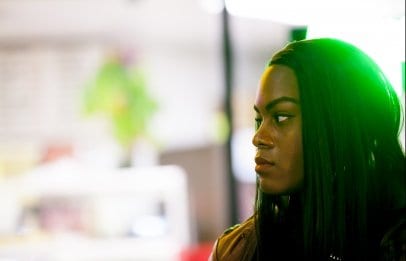It’s an eerily and typically snowless Christmas Eve in Los Angeles when two trans women sex workers decide to track down an unfaithful pimp. Sin-Dee Rella, who has just finished a 28-day stint in jail, learns that her boyfriend (also her pimp) two-timed her while she was behind bars. Enraged, she drags her best friend Alexandra along as she tears up the city to find him.
Tangerine made a splash with its world premiere at the 2015 Sundance Film Festival. In addition to its gritty portrayal of LA subcultures, the comedy-drama is the first movie shot only on iPhones to ever show at Sundance. Sin-Dee Rella and Alexandra are played by two trans women — Kitana Kiki Rodriguez and Mya Taylor, respectively. Daily Xtra spoke on the phone with Mya Taylor in this edited and condensed interview.
Daily Xtra: Is this your first major acting break? I read on your IMDB page you were on a series five years ago.
Mya Taylor: Hollywood Wasteland? I don’t really think that counts, because it was before my transition. That was a whole different person. He died, but I get his credit.
You play a very funny, very edgy character. How much of you is in your character?
She was definitely a character that I had to make up. So, her personality is similar to me, but she’s still very different from me . . . You’d have to meet me in person to see what I’m talking about.
Your character is misgendered a few times and at one point you and Sin-Dee get called “gay prostitutes.” Was that difficult?
No, because it’s a movie. And as far as being gay . . . for me, personally, I have to say — and I’ve talked to lots of other trans people about this — there is the L-G-B-T and Q and the LGB are all about sexuality, but being trans is your life. You are that person. So I really feel like T and Q should not even be associated with the L, G and B. I don’t think we should be under the same umbrella.
It’s hard to know where the community begins and ends or whether there are several communities.
I identify as a transgender woman. I am female. There’s nothing gay about me. My boyfriend is heterosexual too. He sees me as a woman.
What do you think of the movie’s portrayal of trans women?
Everything in the movie is real. These are real issues. Think about how Alexandra and Sin-Dee got out into the street. Think about why they are so close to each other. It’s because they don’t have family. They got pushed out of their families because of their lives.

I applied for 186 jobs in one month and I did multiple multiple interviews. I was doing three and four interviews a day and I did not get one job. I got turned down so much because I looked like one thing and my ID said the other thing.
I actually caught a few people discriminating against me and I had the proof and I could have sued them. And I did not, because I don’t want to sue anybody. I just wanted to get a regular job and have a normal life like everybody else.
So you would say it’s a very realistic portrayal of some people’s experience?
It’s not just [that area of LA], but from my experience it’s normally there. Those are sex-workers and everything because they have to. Nobody wants to have sex with people for money — that’s uncomfortable. But that’s happening out there and it’s real and I’m glad that it’s in this movie so people can actually see that this is what happens . . . Not every transgender person goes through that, but there’s a majority of us that do do that.
Many people who do sex work would argue it’s not something they’re forced to do — they do it because they want to. They think it should be considered as legitimate as any other job.
And the reason for that is because they know that most employers will not hire them. So it’s embedded into somebody’s head that, Okay, this is my job — I’m just going to be proud of this. And if it’s legalized, then you stop going to jail for it.

At one point you sing. It’s really beautiful, but it’s so different from your speaking voice — is that actually you singing?
I’ve been singing for years, so I’m pretty much a pro at my voice. Of course, as with any craft, you can always learn more, but, yes, I’ve pretty much explored my voice . . . If you asked me what I would really want to do between singing and acting, I’d probably lean toward singing more, because I’m more skilled at it . . . I am working on my first album.
What would you say audiences take away from this movie?
Fun and laughter. That was my main focus point.


 Why you can trust Xtra
Why you can trust Xtra


